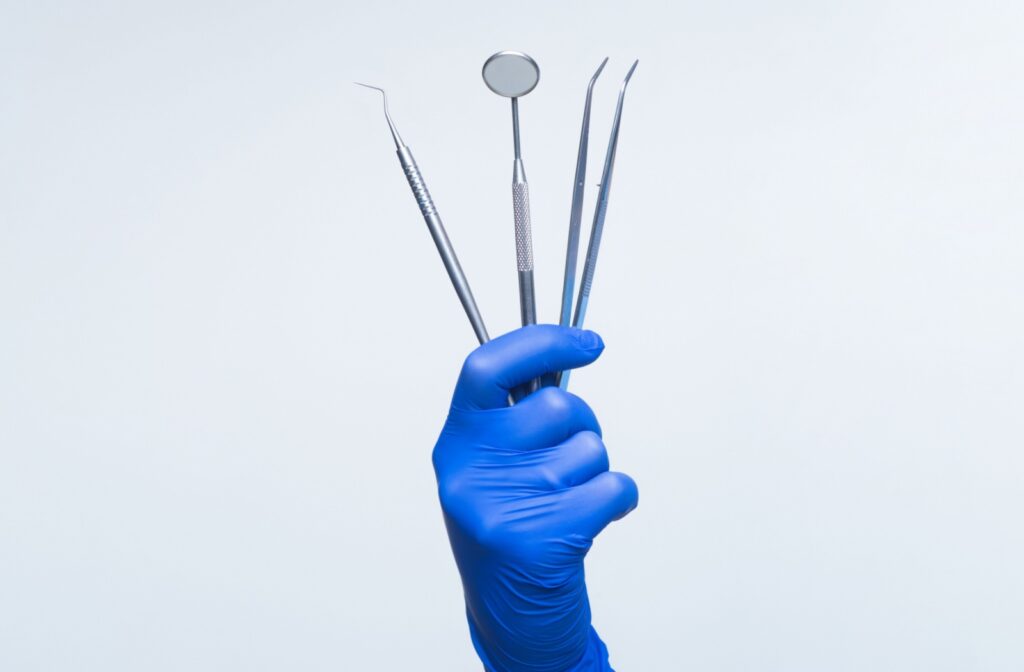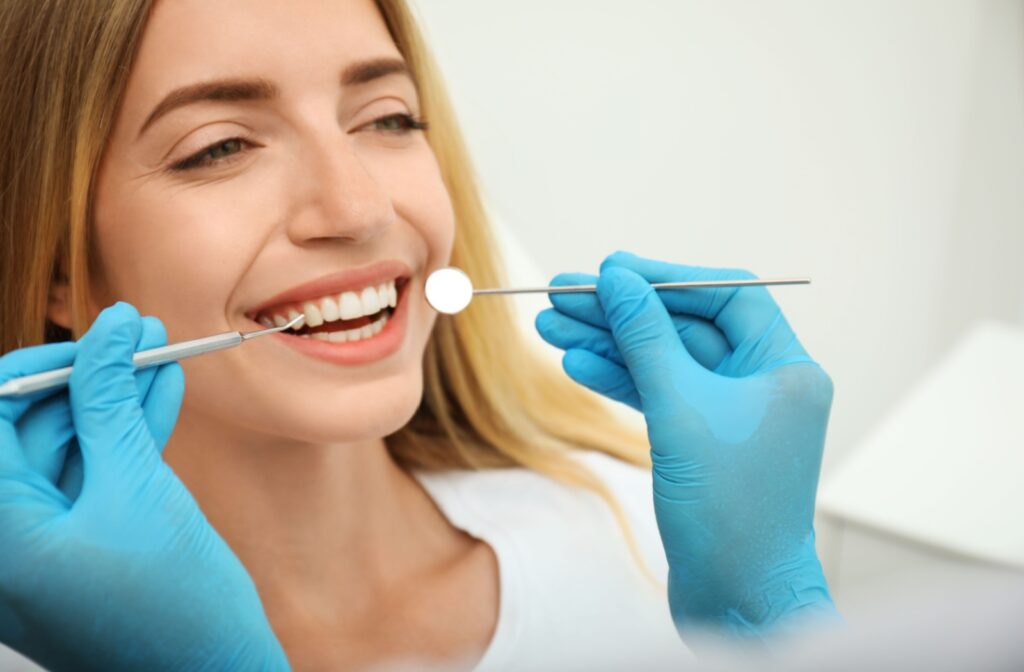If you don’t remove plaque through brushing and flossing, it may harden into a substance called tartar. Brushing and flossing cannot remove tartar, so generally you’ll need to visit your dentist to get it professionally cleaned.
But is it possible to remove tartar at home by yourself, without visiting the dentist? Unfortunately, the answer is no: tartar cannot be safely removed at home. Professional tools and training are required, and attempting to remove tartar at home puts the health of your teeth at risk. Only a dentist or a licensed dental hygienist can safely remove tartar using professional tools.
Many people benefit from visiting their dentist every 3-6 months, but your hygienist or dentist will recommend the right schedule for your individual oral health needs. If dental visits give you anxiety, you’re not alone. Many clinics also offer care options to help patients feel more comfortable.
What Is Tartar?
Every day, we develop a clear layer of bacterial film over our teeth. This is called plaque, and if it’s not removed by brushing or flossing, it can harden into a substance called tartar. Otherwise known as calculus, tartar forms within 24 to 36 hours. It’s composed of dead bacteria and mineralized proteins from saliva. Minerals in tartar include calcium phosphate, calcium carbonate, and magnesium phosphate.
According to the Canadian Dental Association (CDA), tartar can only be removed professionally in a dental clinic. But if you consistently brush and floss, you can remove plaque and prevent it from turning into tartar in the first place.
How Tartar Affects Dental Health
Tartar build-up can lead to staining and crusting on the teeth, bad breath, and gingivitis, which is an early stage of gum disease. Untreated tartar can also increase your risk of developing cavities, gum recession, and increasingly severe gum disease.
How Dental Professionals Remove Tartar
Brushing and flossing don’t remove tartar, but a dentist or dental hygienist can use a professional tool called a scaler to carefully remove it. Attempting to use dental tools yourself to remove tartar can lead to damaging the roots of your teeth. If you have heavier tartar buildup, you may need additional sessions or fine scaling to thoroughly clean the teeth and gums.
So, how often should you get your teeth professionally cleaned? This can vary from person to person because we all have different mouths. For many people, visiting the dentist every 3-6 months is beneficial. But the CDA recommends asking your dentist for a personalized recommendation based on your personal oral health status.

Oral Hygiene Facts & Myths
You may have heard of claims that you can remove tartar at home with household ingredients. However, this is a task best left for the professionals. Attempting to scrape away tartar on your own can damage your teeth.
Baking Soda (Myth)
Some people suggest using baking soda to remove tartar. This is not true; baking soda cannot break down hardened tartar. At best, baking soda toothpastes may help reduce plaque buildup when used as part of daily brushing, but they are no substitute for professional cleanings.
Oil Pulling
Oil pulling — swishing edible oil in your mouth — is often promoted online as a way to improve oral health. The scientific evidence is weak and inconsistent, and major dental associations do not recommend it. Brushing, flossing, and professional dental care remain the only reliable ways to manage plaque and tartar.
The Bottom Line
Home remedies may sound appealing, but they cannot remove tartar. The only safe and effective way to deal with tartar buildup is through professional dental cleanings.
Tartar Prevention Tips
Because there is limited evidence on household remedies for removing tartar, we recommend focusing on preventing tartar build-up in the first place. By prioritizing prevention, you can potentially avoid complex, costly, and uncomfortable treatments in the future.
Preventing tartar is quite simple, but it does require consistent and diligent effort:
- Brush your teeth twice a day: Look for products that hold the CDA Seal. These products have oral health benefits that have been validated by the Canadian Dental Association.
- Floss your teeth once a day: If you don’t floss, you miss one-third of your teeth’s surface.
- Use an alcohol-free and antibacterial mouthwash: Again, look for products that contain the CDA Seal.
- Don’t smoke: Smoking and using other tobacco products can raise your risk of developing tartar.
- Get regular professional cleanings: Brushing and flossing are excellent preventive tools, but they don’t replace regular professional cleanings. Many people benefit from getting a cleaning twice a year.
Get Your Teeth Cleaned in Surrey
At Genesis Dental, we’re here to help you maintain a healthy smile with regular exams, professional cleanings, and personalized guidance for your oral health. Our goal is to make dental care straightforward and stress-free, whether you’re here for preventive care or addressing concerns like tartar and gum disease.To make your visits easier, we offer direct billing to major dental benefit plans and options designed for your comfort, including needle-free dentistry.
Protecting your oral health is a lifelong commitment. Schedule your next cleaning with us today and take the next step toward a healthier smile.




